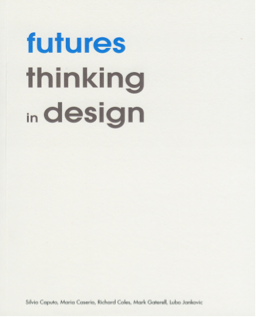Maria Caserio
Details of present and previous employment
Presently: Researcher for Birmingham City University, Birmingham School of Architecture
Previously: September 2012 – January 2013 Researcher for the University of Birmingham, Department of Civil Engineering - secondment to Building Research Establishment (BRE).
March 2008 – April 2012 Sustainability Consultant working for Birmingham School of Architecture at Birmingham City University led by the University of Birmingham, Department of Civil Engineering for EPSRC funded projects Eastside and Urban Futures
February 2001 – March 2004 Research Associate, University of Central England (now Birmingham City University), School of Architecture for Project URGE: Development of Urban Green Spaces to Improve the Quality of Life in Cities and Urban Regions, funded under EU Framework V programme, Environment and Sustainable Development.
September 2000 – January 2001 Research Associate, Institute of Architecture and Technical Urbanism, Faculty of Engineering, University of Genoa.
October 1999 – March 2000 Landscape Architect at the Department of Planning and Landscape, Regional Authority Offices in Liguria.
September 1999 – February 2000 Architectural Assistant for Studio Varese, Architects and Design Consultants in Genova.
Current Activity
Dr Caserio is part of the design futures research strategy for the School of Architecture, which is embedded in the Architecture PG Diploma and Urban Design MA . Her research activities span the period from 1997 to the present and represent working within the UK and across Europe focusing on aspects related to sustainable urban environments.
Dr Caserio has carried out research for UK research councils and has undertaken consultancy work for several Universities, regional agencies, UK and European design practices. Her Birmingham City University publication Futures Thinking in Design; targeted the architectural sector and has been used to develop further collaborations under the Centre for Design and Creative Industries (CDCI).
She has contributed to the Sustainability and Resilience MRes at the University of Birmingham and additional postgraduate or undergraduate modules including both development of materials and delivery to the students.

Qualifications
March 2005 - PhD Title of thesis; The Structure, Dynamics and Perception of the Landscape of the Val Fontanabuona, Northern Italy, Birmingham Institute of Art and Design, University of Central England (now Birmingham City University) in collaboration with the University of Genoa (Supervised by Prof Derek Cassidy, Dr Richard Coles and Prof Tom Muir).
June 1997 - BA (Hons) Landscape Architecture, Birmingham School of Architecture and Landscape, Faculty of the Built Environment, University of Central England (now Birmingham City University).
Memberships
Fellowships
Honorary Research Fellow for the University of Birmingham
Visiting roles
EU URBACT thematic expert for Environmental Issues
Research
Dr Caserio is interested in the ways that environmental systems are identified, perceived and valued in cities and urban areas. Her PhD was awarded in 2005 and examined the ways in which environmental systems are identified and valued in urban areas. It considers the construction of value systems which are based upon user perception, the ways in which professionals value the landscape, the ways in which the tourist industry uses the landscape as a commodity and how businesses relate to landscape identity in respect of their corporate or product image. Since then her research has developed and contributed to many EU and UK funded projects and is multi-disciplinary ranging from quantitative to qualitative aspects of urban sustainability which have focused attention on issues relating to sustainable urban policies, design processes and environmental regeneration.
Current Projects
- AHRC project – futures thinking in design
Maria has developed a detailed understanding of current assessment methods and approaches to the construction industry, applying her skills to develop indicators and tools which includes working with the Building Research Establishment (BRE), building on existing knowledge and training of the Code for Sustainable Homes and BREEAM Communities, to develop new sets of environmental standards. She is currently involved with developing post occupancy evaluation criteria with the building research establishment (BRE) for BREEAM Communities. Research examines the reality of building and development performance that meets and progresses the delivery of sustainable interventions in the context of ‘community expectations’ and the reality of ‘lived in’ or the ‘occupied building’. Resilient futures can only be effective if the design adaptations are rooted in the reality of expectations, are understood and embraced by the community and serve to express the quality of the lived in environment in positive ways that are appreciated, upheld and celebrated by the community. As such the project aims to further understand the nature of the connections and flows which underpin the development of sustainable communities, how they can be identified, how they are expressed, how they can be used to validate/refine current performance criteria and quality grading.
- Nesta project – Rethinking Parks
Birmingham’s idea is to develop and pilot a new economic model for the city’s entire green and blue estate –based on natural capital. To test its validity with the Council, community groups, third sector organisations, key industrial/ growth and development partners, academic institutions and additional stakeholders. This will put parks at the centre of future decision-making at a city (and local scale), but seen through the new lens of natural capital, so providing a sustainable capital and revenue stream. Parks were created at the heart of communities within industrialised cities, their purpose and function was understood, their value unquestioned. Cities now find themselves in a totally new context of globalised markets, international benchmarking and competition for inward investment. They face a series of major challenges, growth, health and well-being time bombs across the population, whilst having to adapt to climate change. This 21st century context forces us to rethink parks. Birmingham’s Natural Capital Plan will span 25 years it will link evidence, policy and delivery across broad agendas, addressing futures scenarios, building resilience into decision-making and maximising available resources to deliver change; bring much needed long-term stability to the parks sector, and use natural capital to measure economic success.
Other Recent Projects
- KTS funded Scheme
The outcomes of the EPSRC funded Urban Futures project – the Urban Futures Method and Tool, are specifically formed and ready for embedding into practice. The knowledge transfer project enabled a six month placement from the University of Birmingham to the Building Research Establishment (BRE) to test and validate the Urban Futures method within the BREEAM Communities scheme. This was the first opportunity to impact practice at the national scale. A report was delivered to BRE, which included a literature review, list of indicators and assessment criteria for post occupancy evaluations.
- EPSRC ‘Urban Futures’ project
Sustainability is about putting in place solutions that will yield a positive legacy. Resilience is about putting in place solutions that are resistant to future uncertainties. Large investments are being made today to make our cities more sustainable; the success of these investments depends on their resilience and how the future develops. The Urban Futures Method aims to broaden the way we think about the form, function, and context of urban development and regeneration by focussing on the likely long-term performance of today’s urban design solutions, and their associated vulnerabilities.
- EPSRC-funded SUE1 project - Birmingham Eastside
This project adopted Birmingham Eastside as a Regional Demonstrator of Sustainable Urban Redevelopment that led to the Urban Futures project and had strong practitioner influence in Birmingham. It was awarded a grant of £250,000 from the EPSRC and Advantage West Midlands and took place over eighteen months from May 2003. Research investigated the regeneration of Birmingham Eastside and provided a Regional Demonstrator of the implementation of sustainability into the Urban Environment. Sustainable regeneration underpins the 10-year master-plan to transform this 170 hectare, city centre site into an exciting, new, multipurpose development incorporating the themes of learning, technology and heritage.
- Leonardo da Vinci programme – Europark project
The Europark project identified training needs and project beneficiaries to provide high quality training, promote multi-disciplinary training, develop university courses in exchanging, testing and implementing training modules, practices and initiatives of sustainable development in land use resources, environmental education and rural tourism. The project delivered a catalogue of good practices and pilot experiences, providing guidelines for the implementation of sustainable development processes in the form of a book. Training modules were also designed to meet the needs of the beneficiaries.
- City of tomorrow, 5 framework programme- URGE project
The URGE project provided support methods and measures of green space development and management. The question was, how urban green spaces (both qualitative and quantitative) can be developed from ecological, economic and social perspectives, in which urban areas (localisation, land use pattern) and with the help of which tools and instruments. URGE results including future perspectives, criteria, methods and measures. The manual ‘Making Greener Cities’ (2004) contains a city profile template, a questionnaire about goals and demands for green space and the Interdisciplinary Catalogue of Criteria. The results serve for green space monitoring and improvement of urban development and management.
Publications
Books and chapters
Lombardi DR, Leach J, Rogers CDF, Aston, Barber ARG, Boyko C, Brown J, Bryson J, Butler D, Caputo S, Caserio M, Coles R, Cooper R, Coyne R, Farmani R, Gaterell M, Hale J, Hales C, Hewitt N, Hunt D, Jankovic L, Jefferson I, Mackenzie R, Memon FA, Phenix-Walker R, Pugh T, Sadler J, Weingaertner C, Whyatt D (2012) Designing Resilient Cities - A Guide to Good Practice, HIS Bre Press, Bracknell, UK
Journal articles
Caputo S, Caserio M, Coles R, Gaterell M and Jankovic L (2013) 'A scenario-based analysis of building energy performance', Proceedings of the Institution of Civil Engineers, Urban Design and Planning 2013
Boyko CT, Gaterell MR, Barber ARG, Brown J, Butler D, Caputo S, Caserio M, Coles R, Cooper RFD, Davies G, Farmani R, Hale J, Hales AC, Hewitt CN, Hunt DVL, Jankovic L, Jefferson I, Leach JM, Lombardi DR, MacKenzie AR, Memon FA, Pugh TAM, Sadler JP, Weingaertner C, Whyatt JD and Rogers CDF (2012) 'Benchmarking sustainability in cities: The role of indicators and future scenarios', Global Environmental Change, vol.22, pp. 245-254
Caputo S, Caserio M, Coles R, Gaterell M and Jankovic L (2011) 'Testing energy efficiency in urban regeneration', Engineering Sustainability, Themed Issue On Future Proofing Urban Regeneration, vol. 165(ES1), pp. 69-80
Lombardi DR, Caserio M, Donovan R, Hale J, Hunt DVL, Weingaertner C, Barber ARG, Bryson JR, Coles R, Gaterell MR, Jankovic L, Jefferson I, Sadler JP and Rogers CDF (2011) 'Elucidating Sustainability Sequencing, Tensions and Tradeoffs in Development Decision–Making', Environment and Planning B, Planning and Design, vol. 38.
Hunt D, Lombardi DR, Atkinson S, Caserio M et al. (2011), 'Scenario archetypes: converging rather than diverging themes', 1st World Sustainability Forum, 2011, November, 1-30; Sciforum Electronic Conferences Series. http://www.sciforum.net/presentation/720
Caserio M, Council L, Jefferies T (2011) 'Competing Logics: Design Processes and Policy Strategies', AESOP conference.
Conference presentations
In June 2009, Maria was invited as a speaker for international project and RICS conference concerning sustainability and property management led by the Polytechnic of Milan, the Dipartimento di Scienze e Tecnologia dell'Ambiente Costruito (BEST, Building Environment Science & Technology).
